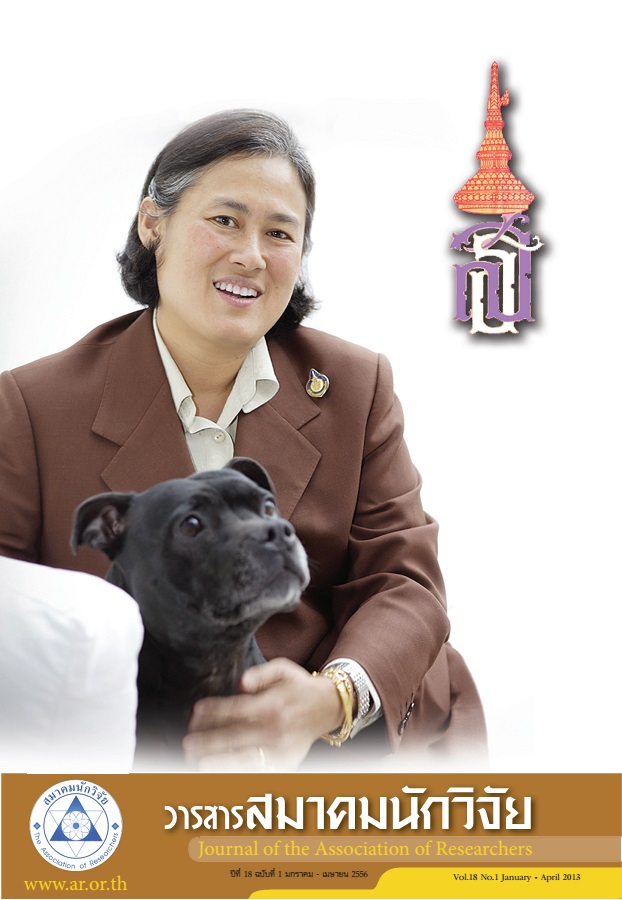Perceptions of Husbands toward Father Roles during Their Wives' Preg nancy, Ban Na Jareun Amphure DetUdom, Ubon Ratchathani
Main Article Content
Abstract
Maternal and child health in pregnancy period is exclusively important for gaining with World Health Organization (WHO) recommendations, reducing Maternal and Child Mortality. There are many factors inufluenced with maternal and child health. Father role is one important issue effecting to pro mote maternal and child health in pregnancy. This descriptive study aims to explore perceptions of husbands toward father roles during their wives' pregnancy. These 38 participants accepted to share their first experiences being fathers. Data were recruited when they visited at Ante Natal Clinic (ANC) and were collected between October and December, 2010 at Ban Najareun, AmphureDetUdom, Ubon Ratchathani, Thailand. The questions were focused on their perceptions of father roles related to care during pregnancy period. There were five perception themes asked the participants 1) pregnant accep tation 2) infants-father relationship 3) changing: developing to be a father 4) father roles and 5) partner relationship Data were analyzed by using descriptive statistic analysis: frequency, percentage, mean, mode, and standard deviation. There were four main issues related to those five themes 1) pregnancy acceptation 2) infant-father relationship, 3) changing: developing to be a father and 4) partner relationship.Because of those perceptions led the participants preparing themselves to be fathers, they felt anxiety related to their knowledge and money expeditions. Therefore,this study could be applied for health promotion among husband groups focusing on both methods and processes to ensure them gaining more infor mation and knowledge related to pregnancy care individually which can suite them felt more right and confidently with their roles while they adopted their children.
Article Details
บทความที่ปรากฏในวารสารนี้ เป็นความรับผิดชอบของผู้เขียน ซึ่งสมาคมนักวิจัยไม่จำเป็นต้องเห็นด้วยเสมอไป การนำเสนอผลงานวิจัยและบทความในวารสารนี้ไปเผยแพร่สามารถกระทำได้ โดยระบุแหล่งอ้างอิงจาก "วารสารสมาคมนักวิจัย"
References
ฉวีเบาทรวง. (2538) การส่งเสริมสัมพันธภาพระหว่างบิดามารดากับทารก.ภาควิชาการพยาบาลสูติศาสตร์และนรีเวชวิทยา คณะพยาบาลศาสตร์มหาวิทยาลัยเชียงใหม่,
สมจิตร สิทธิวงศ์ (2541). การรับรู้บทบาทของสามีในระยะที่ภรรยาตั้งครรภ์ วิทยานิพนธ์ปริญญาพยาบาลศาสตรมหาบัณฑิต สาขาวิชาการพยาบาลแม่และเด็ก, บัณฑิตวิทยาลัยมหาวิทยาลัยเชียงใหม่
Auvenshine, M. A., & Enriquez, M. G. (1990). Comprehensive maternity nursing, Boston: Jones and Bartlett.
Chatchawet, W., Sripichyakan, K., Kantaruksa, K., Nilmanat, K. & O'Brien, A.B. (2010).“Support from Thai male partner when an unwanted pregnancy is terminated” Pacific Rim Int J Nurs Res, 14(3), 249-261.
Baron, R. A. (1989). Psychology: Essential Science. Boston: Allyn & Bacon.
Bckstrm, C., &Wahn, H. E. (2011).“Support during labor: First-time father's description of requested and received support during the birth their child” Midwifery, 27(1), 67-73.
Fenwick, J., Bayes, S., & Johansson, M., (2011). A qualitative investigation into the pregnancy experiences and childbirth expectations of Australian Father-to-be. Sexual & Reproductive Healthcare, Article in press.
Fletcher, H. Hanton., S. Mellalieu., S. D. (2006). An organizational strem review: Conceptual and theoretical inner in Compettiue apart. In: Hanton.s' Mellalieu SD, eds. Literature reviews in sport psychology. 321-373 New York: Nova Science
Women and Birth, 24(3), 129-136.
Johansson, M., Rubertsson, C., Rdestad, I., & Hildingsson, I. (2012). Childbirth: An emotionally demanding experience for fathers. Sexual & Reproductive Healthcare, 3(1), 11-20.
Kaewsarn, P., Moyle, W., & Creedy, D. (2002). Traditional Postpartum Practice among Thai Women, Journal of Clinical Nursing. 41(4), 385-366.
Ozkan, A. I., & Mete, S. (2010). Pregnancy planning and antenatal health behavior: finding from one maternity unit in Turkey. Midwifery, 26, 338-347.
Ladwig, P.W., London, M. L., & Old, S. B.(1994). Essential of maternal-newborn nursing.(3 rd ed.).Redwood City: Addison Wesley Nursing. May, K. A.(1982, November/December). Three phases of father involvement in pregnancy.Nursing
Research,3.1, 337-342. May, K. A., & Mahlmeister, L. R. (1990). Comprehensive maternity nursing.
Philadelphia: J.B.Lippincott. Pillitteri, A. (1985). Maternal-newborn nursing care of the growing family. (3 rd ed.). New York: Litte Brown. Ronsmans, C., Graham, W., (2006). Maternal mortality: Who, when, where, and why. Lancet. 2006;368:1189– 1200.
Lancet Maternal Survival Campaign Rubin, R. (1975). Maternal tasks in pregnancy. Journal of Maternal Nursing., 4(3),143 – 153.
Sapkota, S., Kobayashi, T., & Takase, M. (2012). "Husbands' experiences of supporting their wives during childbirth in Nepal”. Midwifery, 28(1), 45-51.
Sherwen, L. N., Scoloveno, M. A., & Weingarten, C. T.(1991). Nursing care of the childbearing family. NewYork: Appleton Lange. World Health Organization (WHO), (2004). UN Children's Fund.UN Population Fund. Maternal mortality in
2000: estimates developed by WHO, UNICEF, UNFPA, Geneva: World Health Organization.


